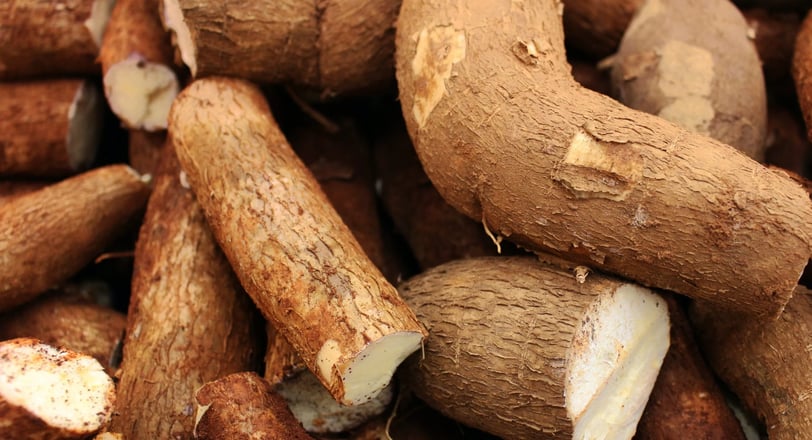Cassava Cake: The Amazonian Powerhouse Your Body Has Been Craving
Descrição do post.
HEALTHY DISHES
CILZA DUARTE
4/20/20256 min read


Cassava Cake: An Amazonian Source of Energy & Nutrients.
The first time I watched my grandmother's hands working cassava into a cake, I didn't realize I was witnessing culinary alchemy. She hummed softly while transforming this unassuming root into something magical—a dense, slightly sweet delicacy that somehow managed to be both humble and extraordinary. Years later, I'd learn that this simple cake wasn't just feeding my soul; it was nourishing my body in ways that modern processed desserts could never match.
I've since discovered that while quinoa and açaí steal the superfood spotlight, cassava cake quietly delivers an impressive nutritional punch that rivals many trendy health foods. And unlike those Mediterranean almond flour creations that cost half your paycheck, this Amazonian staple offers accessible nutrition with deep cultural roots.
The Forgotten Energy Source of Indigenous Wisdom
Long before "complex carbohydrates" became nutritionist buzzwords, indigenous communities throughout the Amazon understood cassava's remarkable ability to sustain energy levels. Unlike the rapid blood sugar spikes triggered by refined carbohydrates, cassava cake provides a steady, sustained energy release that actually supports metabolic balance.
A typical slice of traditional cassava cake contains approximately 25-30 grams of complex carbohydrates. These aren't your villain carbs that nutritional fear-mongering has taught us to avoid. These are the essential fuel sources that power everything from basic cellular functions to higher cognitive processes.
What makes cassava particularly interesting is its unique carbohydrate composition. The starch molecules in properly prepared cassava have a structure that requires more comprehensive digestion, resulting in a gentler impact on blood glucose levels compared to wheat-based desserts. (I'm looking at you, chocolate cake, with your dramatic sugar rollercoaster effects.)
Fiber: The Digestive Game-Changer
Modern diets often fall woefully short on fiber intake. Enter cassava cake, with its impressive 4-6 grams of dietary fiber per serving—approximately 15-20% of your daily requirements in one delicious slice.
But cassava's fiber story gets even more interesting. This root contains both soluble and insoluble fiber in an ideal balance that supports digestive health in multiple ways:
The soluble fiber acts as a prebiotic, nourishing beneficial gut bacteria that influence everything from immune function to mental health. Meanwhile, the insoluble fiber provides the mechanical "scrubbing" action that keeps your digestive system running smoothly.
Traditional preparation methods—soaking, fermenting, and slow cooking—actually enhance these fiber benefits by making them more bioavailable. Na prática, como dizemos na Amazônia (in practice, as we say in the Amazon), grandmothers understood gut health centuries before probiotics became a billion-dollar industry.
The Vitamin Vault: B-Complex and Vitamin C
While Mediterranean desserts might boast antioxidants from fruits and nuts, cassava cake delivers an impressive vitamin profile that's uniquely valuable:
The B-vitamin content deserves special attention. A slice of traditional cassava cake provides meaningful amounts of several B vitamins, including:
B1 (thiamine): supporting energy metabolism
B2 (riboflavin): crucial for cellular function
B3 (niacin): important for nervous system health
B6 (pyridoxine): essential for protein metabolism
What's particularly remarkable is how these B vitamins work synergistically when consumed together, as they are in cassava cake. Unlike isolated supplements, food-based vitamin complexes offer enhanced bioavailability and function.
Vitamin C content depends somewhat on preparation methods, but properly made cassava cake can retain significant amounts of this crucial antioxidant. A typical serving offers approximately 15-20% of your daily vitamin C needs—not bad for a dessert! (And certainly better than that chocolate mousse you were considering.)
Mineral Wealth: Calcium and Magnesium Dynamic Duo
Perhaps most surprising to nutritionists unfamiliar with traditional Amazonian foods is cassava cake's impressive mineral content. The calcium-magnesium combination, in particular, deserves our attention.
A slice of traditional cassava cake contains approximately:
120-150mg of calcium (about 10-15% of daily needs)
60-80mg of magnesium (roughly 15-20% of daily requirements)
This calcium-magnesium ratio is remarkably beneficial for several reasons. First, it's close to the 2:1 calcium-to-magnesium ratio that many nutritional experts consider ideal for absorption. Second, these minerals work together to support not just bone health but also muscle function, nervous system regulation, and cardiovascular health.
Even more fascinating is how traditional preparation methods enhance mineral bioavailability. The natural fermentation process often used in authentic cassava cake recipes reduces phytic acid—an anti-nutrient that can block mineral absorption. This ancestral wisdom accomplished what modern food science is only beginning to understand: optimizing nutrient availability through preparation techniques.
Beyond Nutrition: Bioactive Compounds
É de lascar! (It's amazing!) as we say in parts of the Amazon. Beyond the macro and micronutrients, cassava contains compounds that have intrigued researchers studying traditional foods:
Resistant starch, which functions similarly to fiber and may help regulate blood sugar and improve insulin sensitivity.
Saponins and flavonoids with potential anti-inflammatory properties, though concentrations vary based on preparation methods.
What's particularly interesting is how these compounds seem to work within the whole food matrix. The traditional cassava cake, with its combination of cassava, eggs, coconut milk, and sometimes regional fruits, creates a nutritional symphony that's far more powerful than its individual components.
From Traditional Wisdom to Modern Kitchen
Preparing authentic cassava cake requires some understanding of traditional techniques. The cassava root contains compounds that can be toxic if improperly prepared—a fact that indigenous cooks have managed successfully for centuries through specific preparation methods.
Traditional processes like soaking, fermenting, pressing, and thorough cooking not only detoxify cassava but also enhance its nutritional value. (Nature is clever that way—sometimes the processing is part of the nutritional magic.)
Adapting these techniques for modern kitchens doesn't require specialized equipment, just a bit of patience and respect for traditional methods:
Starting with fresh cassava: peel, grate, and soak it in water for at least 30 minutes
Pressing out excess moisture and toxins
Combining with eggs, coconut milk, and a touch of raw honey
Baking slowly at moderate temperatures
Modern shortcuts using pre-made cassava flour can work, but they often sacrifice both the nutritional complexity and the authentic texture that makes traditional cassava cake so remarkable.
Cassava Cake vs. Western Desserts: The Nutritional Showdown
When compared to typical Western desserts, cassava cake offers a significantly better nutritional profile:
While a slice of chocolate cake might deliver empty calories and a whopping 30-40 grams of refined sugar, cassava cake provides complex carbohydrates, fiber, vitamins, and minerals with modest sugar content (typically 10-15 grams per serving, often from natural sources).
The glycemic impact tells an even more compelling story. Standard wheat-based desserts can send blood sugar levels soaring, while properly prepared cassava cake causes a much gentler rise due to its fiber content and complex carbohydrate structure.
Perhaps most importantly, cassava cake satisfies the natural human desire for something sweet without triggering the overconsumption patterns often associated with highly processed desserts. There's something grounding about its density and subtle sweetness that signals sufficiency to your brain. (Honestly, when was the last time you felt satisfied after just one cookie?)
Cultural Sustainability Meets Nutritional Wisdom
What fascinates me most about cassava cake is how it represents the intersection of cultural preservation and nutritional intelligence. Indigenous communities didn't develop these recipes with nutritional science in mind—they evolved them through generations of observation and wisdom.
The result is a food that nourishes on multiple levels: providing essential nutrients, connecting people to cultural heritage, and supporting sustainable food systems that work with local ecosystems rather than against them.
In an era of climate change and food insecurity, traditional foods like cassava cake offer valuable lessons about resilience and adaptation. Cassava itself is remarkably drought-resistant and can thrive in conditions where other crops fail—a characteristic that may become increasingly valuable as climate patterns shift.
Bringing Amazon Wisdom to Your Kitchen
You don't need to live in the Amazon to incorporate cassava's benefits into your life. While authentic cassava cake might require some ingredient hunting, the principles behind this nutritional powerhouse can inspire more accessible adaptations:
Experiment with cassava flour in baking (though be aware that it behaves differently than grain-based flours) Try fermenting cassava products to enhance nutritional value Focus on the whole-food philosophy that traditional cassava preparation embodies
Or, if you're feeling adventurous, seek out authentic recipes that honor the traditional techniques. Your taste buds—and your body—will thank you for the exploration.
As my grandmother would say with a knowing smile, "O que vem da terra, volta para a terra" (What comes from the earth, returns to the earth). There's profound wisdom in this cycle—nourishment that comes from working with nature rather than attempting to outsmart it with hyper-processed alternatives.
A Sweet Conclusion Without the Sugar Crash
The beauty of cassava cake lies not just in what it contains, but in what it represents: a harmonious relationship between human nutrition, cultural wisdom, and environmental sustainability. While not a miracle food (what single food is?), it offers a glimpse into a more balanced approach to nourishment.
So the next time you're considering a sweet treat, perhaps look beyond the familiar. The humble cassava cake might just offer the perfect combination of pleasure and nourishment—a rare balance in today's food landscape.
And really, isn't that what we're all searching for? Food that feeds both body and soul, connecting us to traditions while nourishing our future? I believe cassava cake offers exactly that—one delicious slice at a time.
Visit www.myamazonfood.com for authentic cassava cake recipes and more insights on bringing the nutritional wisdom of the Amazon to your table.
Inspiration - Health
Explore recipes, tips, and culinary articles today.
wellness
Flavor
cilzaduarte@gmail.com
55 81 98087-8684
© 2025. All rights reserved.
